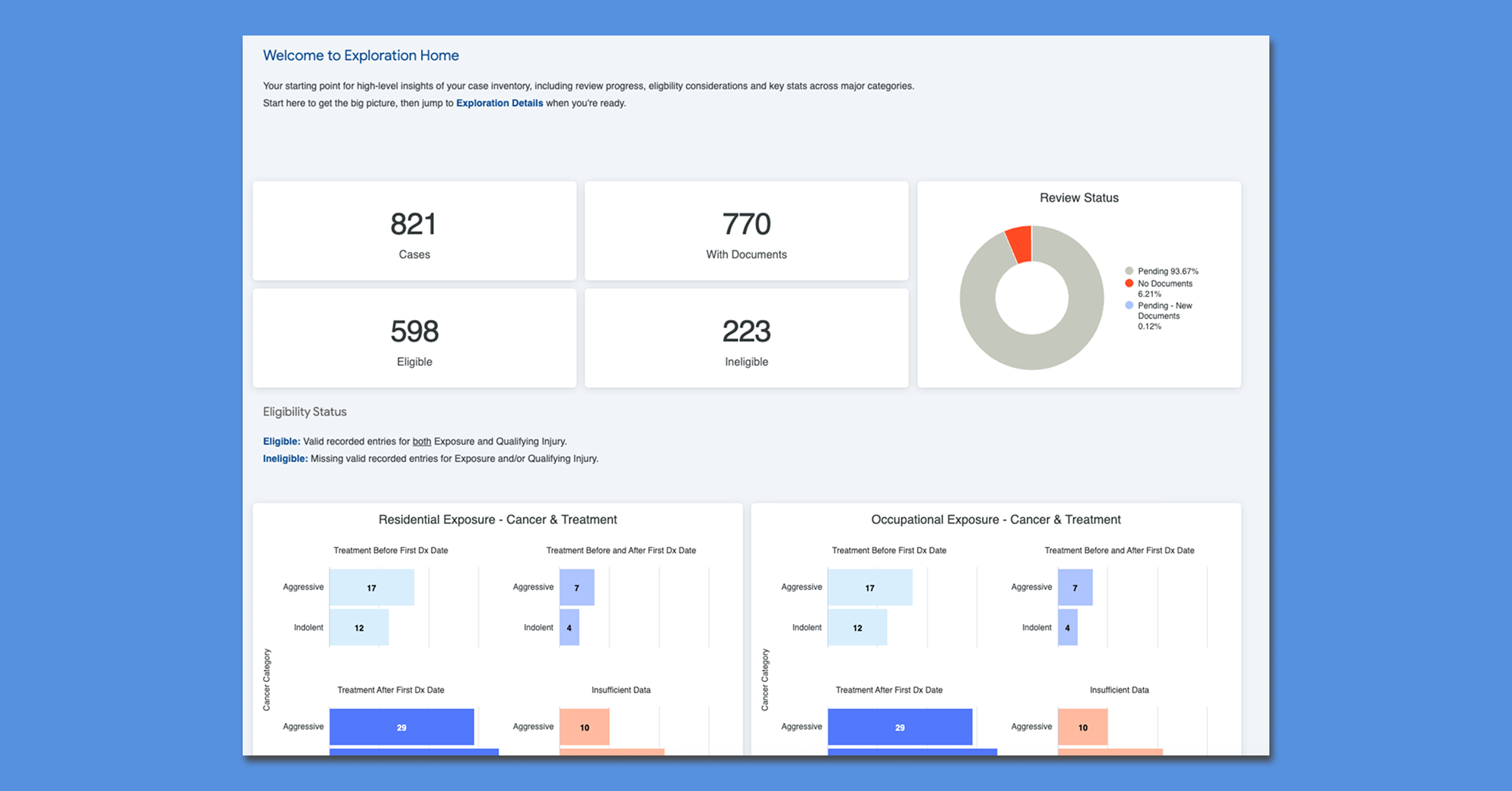Helping law firms get an edge in Roundup litigation
Pattern Data streamlines Roundup litigation by connecting exposure history and medical evidence into a single, review-ready profile. Our AI identifies non-Hodgkin’s lymphoma diagnoses tied to glyphosate use, flags ineligible claims early, and reduces wasted effort. With organized data and clear dashboards, legal teams can move through reviews faster and make confident decisions across their entire docket.

Tag and bookmark critical evidence
Pattern Data tags and organizes exposure details, treatment records, and supporting medical history across claimant files. Firms can instantly locate critical evidence and maintain consistency across reviewers.
Comprehensive Claimant Profiling
Connect medical, exposure, and treatment records into standardized Roundup case profiles. These profiles highlight key factors, identify data gaps, and surface eligibility criteria, which helps teams evaluate claims efficiently and prioritize the strongest cases.
Visualize Claimant Inventory
Get a real-time view of Roundup claims by eligibility status, exposure type, cancer category, and treatment history. Dashboards surface missing data, highlight trends, and help your team prioritize cases that are ready for review.
Claimant Work Product
Generate organized, case-specific reports that summarize exposure details, medical history, and supporting records for each Roundup claimant. These exports give attorneys and paralegals a clear, ready-to-use work product that speeds case preparation and improves collaboration across teams.
Key Criteria for Roundup Litigation Claims
Pattern Data helps legal teams quickly identify the factors that influence case strength in Roundup litigation, including:
Cancers linked to Roundup exposure: Non-Hodgkin’s lymphoma (primary), with some cases alleging leukemia or multiple myeloma.
Treatment history: Prior chemo, radiation, or use of immunosuppressants.
Confounding medical conditions: HIV/AIDS, Hepatitis C, Epstein-Barr Virus, autoimmune disorders, bacterial infections, or elevated LDH levels.
See tagged evidence in context
Reviewers can scan highlighted exposure details, treatment notes, and medical history directly within claimant records. This eliminates wasted time searching through documents and helps teams verify key facts quickly.
.png?width=2000&name=Roundup_TagsBookMark_SC%20(1).png)
Claimant profile at a glance
View a standardized profile showing exposure category, cancer category, diagnosis details, and review progress alongside documents and exports. This helps teams confirm eligibility, spot missing fields, and move confidently to the next case.
.png?width=2000&name=Roundup_ClaimantProfile_SC%20(1).png)
Interactive case dashboards
Drill into claimant data with interactive dashboards that show eligibility, cancer type, exposure history, and treatment status. Visualizations help reviewers compare trends across the docket and identify gaps that need attention.

Generate claimant work product
Export claimant reports that compile exposure details, medical records, and supporting documentation into a single, court-ready file. Pattern Data ensures each report is consistent, accurate, and ready to share with co-counsel or administrators.
.png?width=2000&height=1046&name=Roundup_Export_SC_Canva%20(3).png)
How law firms use pattern data.
At Pattern Data, we ensure the latest security technologies and procedures are in place to keep your clients’ information safe. Here are some of the steps we take to safeguard your data.
Batch Process Records
Process large caseloads quickly using our advanced data processing, tailored specifically for mass tort litigation.
Advanced OCR technology
Convert unstructured medical data into structured, actionable information tailored to Roundup settlement criteria.
Automated recalculations
Easily adapt to new settlement criteria or injury updates with our system’s automated recalculations and export features.
Seamless integration and customization
Integrate with existing processes seamlessly, using customizable scripts, automated actions, and workflow settings to optimize efficiency.
Frequently Asked Questions
Request a Demo.
Request a demo to see how Pattern helps you confidently evaluate and resolve Roundup litigation claims.

